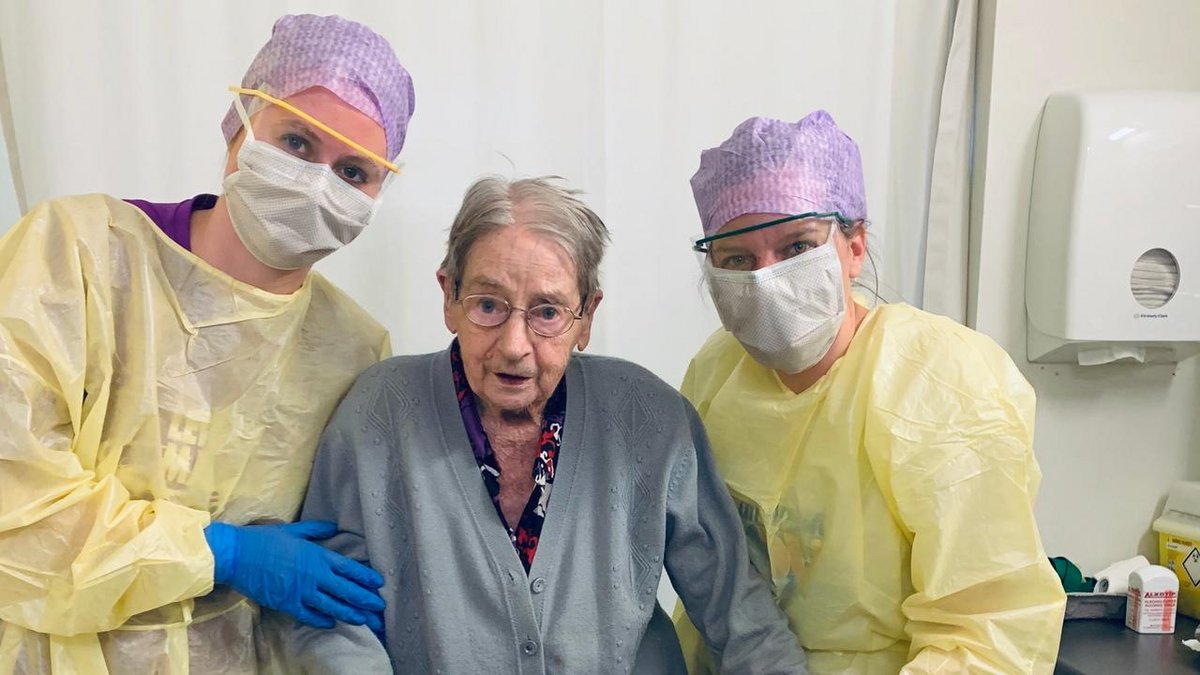Mutual help – indispensable in an emergency situation
by Kathrin and Dr Peter Küpfer P.

The Corona pandemic has activated fundamental positive human trades. In the face of this emergency, examples of people helping each other are accumulating.
Guaranteeing solidarity for all
Withholding medical treatment from a certain age group is not congruent with this upsurge in human solidarity in times of threat. According to newspaper reports in the last few days, this selective medical treatment was probably caused by the extreme emergency situation in a regional hospital in France, which was stretched to the limit by the crisis. As of 21 March, seriously ill patients with COVID-19 over 80 years of age are not to be ventilated, but are to receive palliative care. According to the reports, the responsible ethics committee approved this procedure. The German Foundation for Patient Protection sharply criticised the age criterion of this procedure. Age or origin should not play a role in medical care, said board member Eugen Brysch.1
In principle, laws and orders issued by the government of a democratic state must always be measured against the government main task: to guarantee its citizens a life in freedom, security and human dignity. To all citizens, without exception. The right for unrestricted health care is for all, just as the right for education and the basic services such as water supply, electricity and public transport. In democracy, the principle of solidarity is alive and well, even in the face of adversity, otherwise real democracy would be in poor shape. Therefore democracy means that each case must be treated individually and in a humane way. “In the knowledge that the strength of a people is measured by the well-being of its weakest members”. That was the title of Erika Vögeli’s editorial in the issue no 6, 30 March 2020 of Current Concerns. Therein she rightly recalled the spirit that underlies our constitution.
Making it a principle in Switzerland only to guarantee limited medical care, especially for the elderly, would be contrary to this spirit. People who today are 80 or older, experienced the time of privation as children during the Second World War and have subsequently recreated the prosperity of our country and have supported and consolidated it during the years of economic boom. Most of them worked hard and lived a modest life. They supported the state i.e. by paying their taxes regulary. It would be unacceptable to treat them as “drones” of and as a “burden” to our economic system. This generation does not to be reminded to act with solidarity. Solidarity was conveyed to them through education, parenting and lifestyle. That is why particularly our older fellow citizens have a right to solidarity. They have often rightly reminded us to live more carefully and more modestly. The African proverb is also justified here: “When an old person dies, a library dies.”
We must all stand in solidarity. The President of the Swiss Confederation Simonetta Sommaruga recently strongly demanded the “jolt of reflection” from all Swiss people. This must also shape the spirit of the decrees issued by those responsible. Solidarity does not means obeying orders only, it means much more.
Beat Richner’s hospitals – a valuable model
The Swiss doctor Beat Richner, who was buried last year with all honours, showed in distant Cambodia what is possible for a single person through his lifelong commitment. His example has inspired many. With simple means and the involvement of relatives he saved lives and guaranteed care at a high human and medical level. In doing so, he placed Cambodian children scarred by the war and its disastrous post-war health effects at the centre of his efforts. Amongst others, he tried in vain to obtain urgently needed medicines at a discount price from well-known pharmaceutical companies. He did not want to make a profit with his hospitals, but simply help. Richner then turned to the solidarity of the Swiss people and was successful for many years. Part of his success was also that Beat Richner did not separate his patients. Families stayed together, lived with their sick relatives, mostly children, cooked for them, spent a lot of time with them and helped with the treatment whenever possible.
The importance of compassion
We are not in Cambodia and our health threat is not a consequence of war. But the knowledge that a sick person needs above all compassion and human company – not only specialists and equipment - also applies to us. The sick person is a fellow human being, and in many cases the patient can contribute much more to his health or recovery than we think. Even in the case of the current threat, too few opportunities are being realised.
People are thinking creatively. In a serious car accident, you revive and ventilate the victim if necessary. This was done even in the days of HIV infection – first responders were correspondingly careful. People who are ill need one thing above all, that is human sympathy. Last will and testamentary dispositions to renounce this or that therapy do not create confidence. It is medical encouragement that breathing will become easier again and that the crisis can be overcome. Mechanical intervention is an anonymous makeshift and of great importance in hospitals. But the energy for recovery arises from the solidarity and the confidence that we are being helped for the sake of our humanity. Whether death occurs is not something we humans should, may or want to decide. It is not our task, thank God. A patient remains a relative, friend, neighbour, co-worker and fellow citizen. If we learn to intensify this principle, even simpler means of help will be a relief for everyone. The main thing is that we help! The corona crisis makes us aware of it in many details. This is an opportunity for us all. •
1 Report from Alsace: patients over 80 are no longer ventilated; in: Tages-Anzeiger, Corona-Ticker-International, 3-26-2020 (https://www.tagesanzeiger.ch/coronavirus-ticker-international-970691608020)